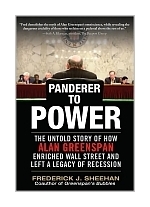|
||
• wydawnictwa polskie
• Zamów informacje o nowościach z wybranego tematu • kontakt
• Cookies na stronie |
PANDERER TO POWER: THE TRUE STORY OF HOW ALAN GREENSPAN ENRICHED WALLSHEEHAN F. / STREET AND LEFT A LEGACY OF RECESSIONwydawnictwo: MCGRAW-HILL , rok wydania 2009, wydanie Icena netto: Alan Greenspan’s 18-year stint as head of the Federal Reserve Bank witnessed some of the most massive upward redistributions of wealth in our nation’s history. It’s now clear that his policies contributed greatly to the transformation of Wall Street from an engine that financed American business to a business-destroying machine—and that Greenspan abetted the hollowing out of the U.S. economy by giving Wall Street and Washington everything they could possibly want. To take the full measure of Greenspan’s culpability, we need to look beyond the disgraced public persona and see him within the broader sweep of his life and times. In Panderer to Power , author Frederick J. Sheehan delivers the first in-depth, critical biography of the man who, for nearly two decades, served as the world’s most powerful banker. Beginning with Greenspan’s formative years as a Depression-era kid from New York City, Sheehan traces his subject’s progress from his days touring America as a reed man with the Henry Jerome Orchestra in the 1940s through his emergence as one of America’s first celebrity economists to his ascent through the ranks of power in D.C. What emerges is a searing portrait of a shameless media hound who ferociously promoted his image as a straight-laced numbers cruncher, a Machiavelli whose political skills far surpassed his skills as an economist. Drawing upon a vast array of original sources, the author leaves little room for doubt: either the “economic genius of our time” was oblivious to the hazards of his irresponsible policy decisions or he knew full well what he was doing, but chose, as he had throughout his career, to put self-interest above the public good. Frederick J. Sheehan is a former director of asset allocation services at John Hancock Financial Services and the coauthor of the critically acclaimed Greenspan's Bubbles. He has written for Marc Faber's Gloom, Boom & Doom Report, Whiskey & Gunpowder, and the Prudent Bear Web sites. He serves as an advisor to investment firms and endowments. He lives in the Boston area.Table of Contents
400 pages, Hardcover Księgarnia nie działa. Nie odpowiadamy na pytania i nie realizujemy zamówien. Do odwolania !. |


